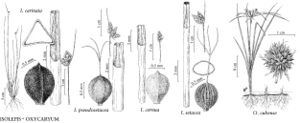Difference between revisions of "Isolepis carinata"
Ann. Lyceum Nat. Hist. New York 3: 349. 1836.
imported>Volume Importer |
imported>Volume Importer |
||
| Line 67: | Line 67: | ||
|publication year=1836 | |publication year=1836 | ||
|special status=Illustrated;Endemic | |special status=Illustrated;Endemic | ||
| − | |source xml=https:// | + | |source xml=https://bitbucket.org/aafc-mbb/fna-data-curation/src/2e0870ddd59836b60bcf96646a41e87ea5a5943a/coarse_grained_fna_xml/V23/V23_219.xml |
|genus=Isolepis | |genus=Isolepis | ||
|species=Isolepis carinata | |species=Isolepis carinata | ||
Latest revision as of 20:39, 5 November 2020
Plants annual; rhizomes absent. Culms 1–25 cm × 0.2–0.3 mm. Leaves: sheaths green to stramineous or brown; distal blade mostly much longer than sheath, to 5 cm × 0.2–0.5 mm. Inflorescences: involucral bract 1, 5–25(–33) mm. Spikelets 1–10 × 1.5–2 mm; scales stramineous to pale orangish, midrib region often greenish, markedly gibbous, prominently to obscurely veined, midrib keeled, finely reticulate at 20X, membranous, hyaline, apex rounded, awned; proximal scale to 2.5(–5) mm, awn to 2 mm; other scales 1.8–2 × 1–1.2 mm, awn 0.2–0.5 mm. Flowers: anthers 0.2 mm; styles 3-fid. Achenes often falling with and clasped by floral scales, dark orange-brown or often whitish, broadly ellipsoid to obovoid or outline subcircular, nearly equilaterally trigonous, faces concave, 1–1.5 × 0.7–1 mm, papillose at 10–15X, papillae in many vertical rows, often obscured by thin, minutely reticulate, whitish surface layer.
Phenology: Fruiting spring.
Habitat: Wet, often drying, freshwater places in grasslands, rock barrens, open woods, lawns, cultivated fields, waste places
Elevation: 0–800 m
Distribution

Ala., Ark., Calif., Fla., Ga., Ill., Kans., Ky., La., Miss., Mo., N.C., Okla., S.C., Tenn., Tex.
Discussion
Isolepis carinata sometimes occurs in mixed populations with the very similar I. pseudosetacea.
Selected References
None.
